
Leopold I was the first King of the Belgians, reigning from 21 July 1831 until his death in 1865.

The Panthéon is a monument in the 5th arrondissement of Paris, France. It stands in the Latin Quarter, atop the Montagne Sainte-Geneviève, in the centre of the Place du Panthéon, which was named after it. The edifice was built between 1758 and 1790, from designs by Jacques-Germain Soufflot, at the behest of King Louis XV of France; the king intended it as a church dedicated to Saint Genevieve, Paris's patron saint, whose relics were to be housed in the church. Neither Soufflot nor Louis XV lived to see the church completed.
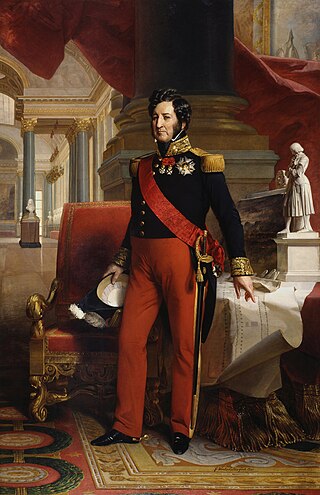
Louis Philippe I, nicknamed the Citizen King, was King of the French from 1830 to 1848, and the penultimate monarch of France. As Louis Philippe, Duke of Chartres, he distinguished himself commanding troops during the Revolutionary Wars and was promoted to lieutenant general by the age of nineteen, but he broke with the Republic over its decision to execute King Louis XVI. He fled to Switzerland in 1793 after being connected with a plot to restore France's monarchy. His father Louis Philippe II, Duke of Orléans, fell under suspicion and was executed during the Reign of Terror.
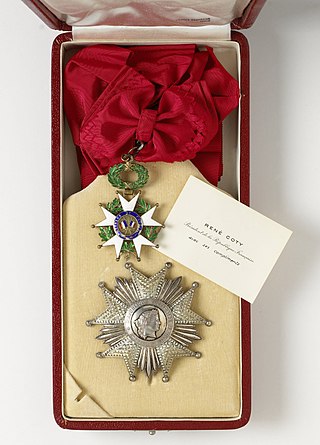
The National Order of the Legion of Honour, formerly the Royal Order of the Legion of Honour, is the highest French order of merit, both military and civil. Established in 1802 by Napoleon Bonaparte, it has been retained by all later French governments and regimes.

Ferdinand Philippe, Duke of Orléans was the eldest son of King Louis Philippe I of France and Maria Amalia of Naples and Sicily. He was born in exile in his mother's native Sicily while his parents were the Duke and Duchess of Orléans. Ferdinand Philippe was heir to the House of Orléans from birth. Following his father's succession as King of the French in 1830, he became the Prince Royal of France and Duke of Orléans. He died in 1842, never to succeed his father or see the collapse of the July Monarchy and subsequent exile of his family to the United Kingdom.

Louis Auguste Blanqui was a French socialist and political activist, notable for his revolutionary theory of Blanquism.
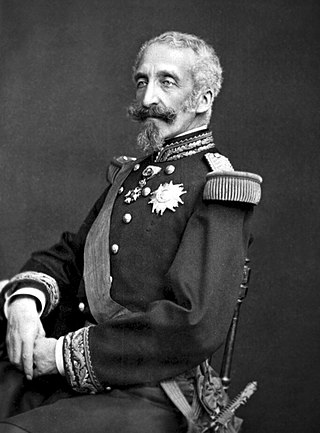
Prince Louis of Orléans, Duke of Nemours was the second son of King Louis-Philippe I of France, and his wife Maria Amalia of Naples and Sicily.

The July Monarchy, officially the Kingdom of France, was a liberal constitutional monarchy in France under Louis Philippe I, starting on 26 July 1830, with the July Revolution of 1830, and ending 23 February 1848, with the Revolution of 1848. It marks the end of the Bourbon Restoration (1814–1830). It began with the overthrow of the conservative government of Charles X, the last king of the main line House of Bourbon.

The Royal and Military Order of Saint Louis is a dynastic order of chivalry founded 5 April 1693 by King Louis XIV, named after Saint Louis. It was intended as a reward for exceptional officers, notable as the first decoration that could be granted to non-nobles. By the authorities of the French Republic, it is considered a predecessor of the Legion of Honour, with which it shares the red ribbon.

The Order of the Holy Spirit, is a French order of chivalry founded by Henry III of France in 1578. Today, it is a dynastic order under the House of France.

Jean Maximilien Lamarque was a French general of the French Revolutionary Wars and the Napoleonic Wars who later became a member of the French Parliament. Lamarque served with distinction in many of Napoleon's campaigns. He was particularly noted for his capture of Capri from the British, and for his defeat of Royalist forces in the Vendée in 1815. The latter campaign received great praise from Napoleon, who said Lamarque had "performed wonders, and even surpassed my hopes".

The July Column is a monumental column in Paris commemorating the Revolution of 1830. It stands in the center of the Place de la Bastille and celebrates the Trois Glorieuses — the 'three glorious' days of 27–29 July 1830 that saw the fall of Charles X, King of France, and the commencement of the July Monarchy of Louis-Philippe, King of the French. It was built between 1835 and 1840.

Jean-Antoine-Joseph de Bry, also spelled Debry, was a French politician of the French Revolution. He served as President of the National Convention, and is famous for the slogan La patrie est en danger he proposed.

National symbols of France are emblems of the French Republic and French people, and they are the cornerstone of the nation's republican tradition.

The Iron Cross was established by law in 1833 following the end of the Belgian Revolution to recognise serious wounds received and bravery in battle by Belgian citizens taking part in the fight for Belgian independence from the United Kingdom of the Netherlands between 25 August 1830 and 4 February 1831. A further royal decree of 22 August 1834 created a second class to the Iron Cross for award to all wounded combatants. Due to the lower perceived importance of the second class award and discontent among recipients, the Iron Cross second class was short-lived and amalgamated to the Iron Cross first class by decree of 21 February 1835. All recipients now received the (original) first class award.
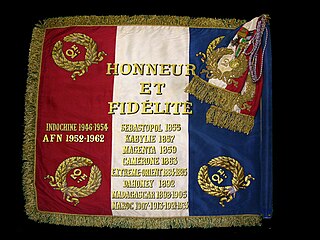
Honneur et Fidélité is the motto of the Foreign Legion in the French Armed Forces. It has been inscribed on Legion flags instead of the Honneur et Patrie inscribed on flags of the regular French Army of the French Republic. Nevertheless, both mottos share a similar past.

Honneur, patrie, valeur, discipline is the motto of the French Navy. It is found inscribed on all ships and buildings, sometimes with each word on its separate plaque at a corner of the superstructure.

Bien mérité de la Patrie is a French expression that qualifies national heroes. During the French Revolution, the phrase became a formula discerned as an award by the National Convention to deserving citizens.
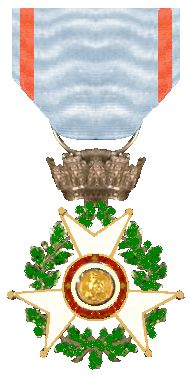
The Order of the Cross of July was a French Order of Merit. It was created on December 13, 1830 by King Louis-Philippe I to thank those who had helped overthrow Charles X and establish a Constitutional monarchy. The order, intended to reward the citizens who were distinguished during the 'Glorious Three Days', included two decorations: the Cross of July and the July Medal.

Eugénie Hamer was a Belgian journalist, writer and activist. Her father and brother served in the Belgian military, but she was a committed pacifist. Involved in literary and women's social reform activities, she became one of the founders of the Alliance Belge pour la Paix par l'Éducation in 1906. The organization was founded in the belief that education, political neutrality, and women's suffrage were necessary components to peace. She was a participant in the 18th Universal Peace Congress held in Stockholm in 1910, the First National Peace Congress of Belgium held in 1913, and the Hague Conference of the International Congress of Women held in the Netherlands in 1915. This led to the creation of the International Committee of Women for Permanent Peace, subsequently known as the Women's International League for Peace and Freedom (WILPF). Hamer co-founded the Belgian chapter of the WILPF that same year. During World War I, she volunteered as a nurse and raised funds to acquire medical supplies and create an ambulance service.




















